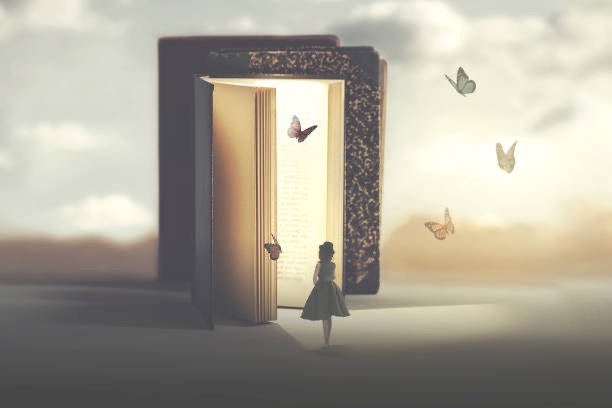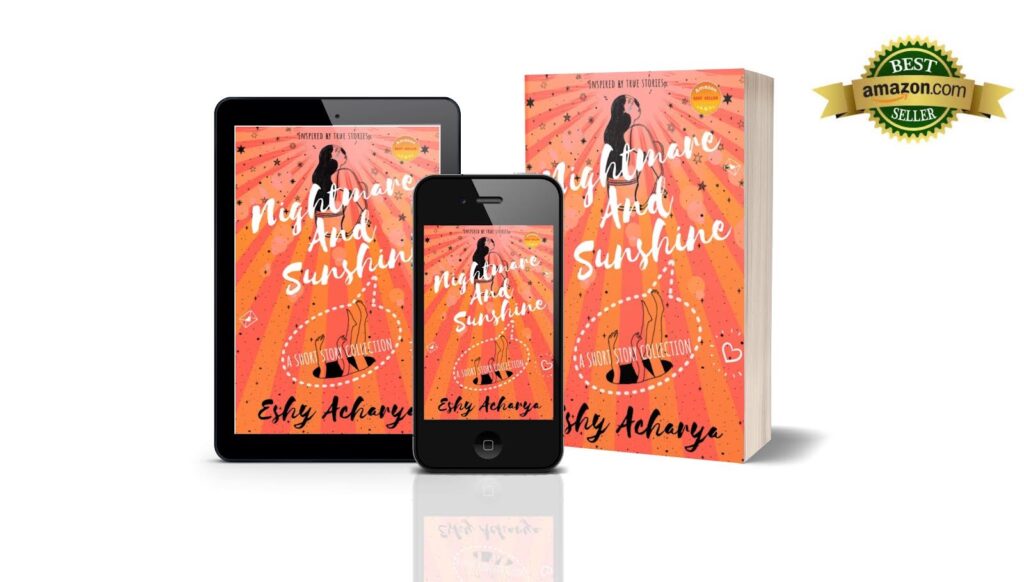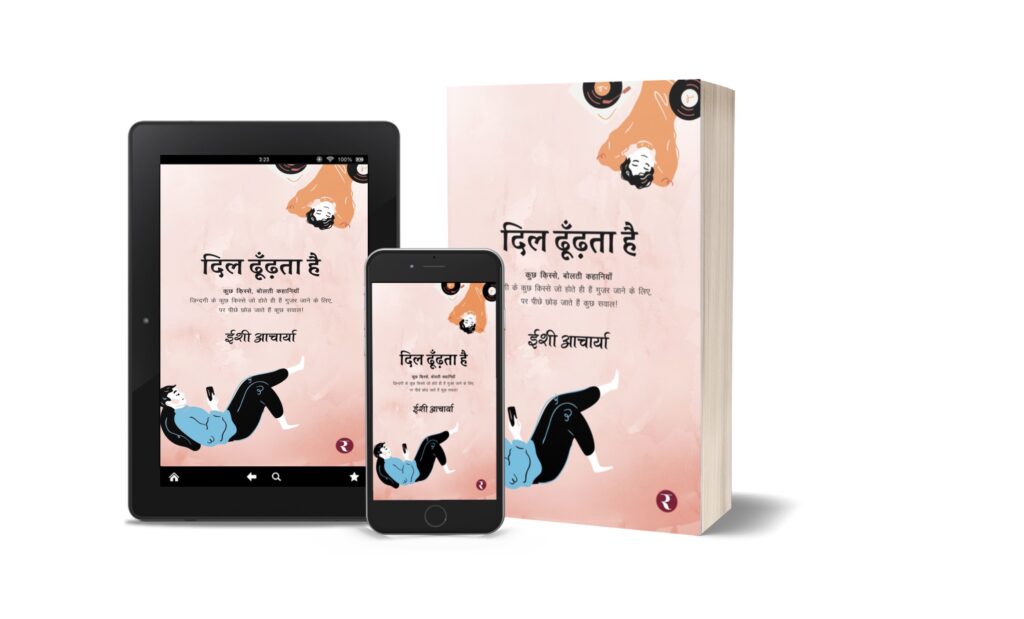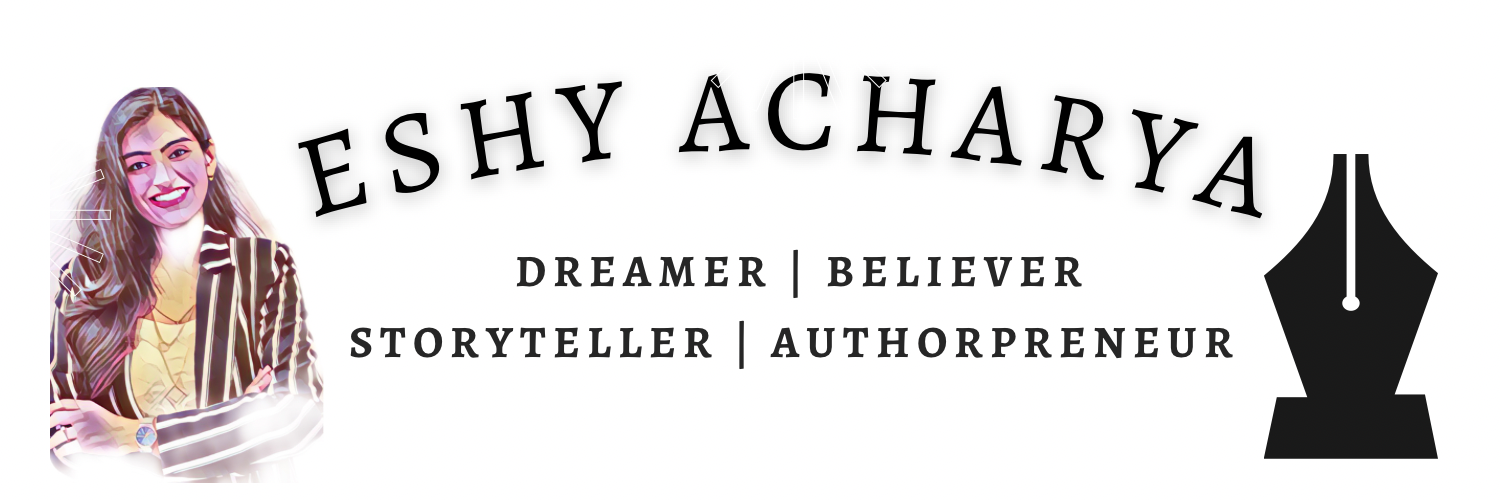
Check out my latest Blog post, I would love to hear your thoughts and engage in a meaningful discussion! Drop a comment and let’s connect.
~ Magic & Love
Eshy Acharya ✍🏼
- The Power of Gratitude

The Power of Gratitude
Unlocking Abundance and Joy in Your Life
Hello, my fellow seeker of joy and abundance! In a world that often feels like a whirlwind of challenges and obstacles, it’s easy to get caught up in the negative and overlook the countless blessings that surround us. But what if I told you that there’s a simple yet profoundly transformative practice that can shift your entire perspective and unlock a life filled with abundance, joy, and wonder? Well, get ready to start a magical journey as we explore the life-changing power of gratitude!

First, let’s dive into the essence of gratitude and its incredible impact on our well-being. Gratitude is the act of acknowledging and appreciating the good things in our lives, no matter how big or small they may seem. It’s about shifting our focus from what we lack to what we have, and cultivating a deep sense of thankfulness for the blessings that fill our days. When we make gratitude a daily practice, we open ourselves up to a world of positive transformation that touches every aspect of our being.
The benefits of practicing gratitude –
The advantages are nothing short of extraordinary. Studies have shown that regularly expressing gratitude can significantly increase our happiness levels, boost our positive emotions, and enhance our overall life satisfaction. It’s like a magical elixir that fills our hearts with joy and our minds with peace, even in the midst of life’s challenges. But the power of gratitude doesn’t stop there – it also has a profound impact on our relationships and social connections.
When we approach others with a grateful heart, we radiate a warmth and positivity that draws people towards us. We become more appreciative of the love and support that surrounds us, and we naturally cultivate deeper, more meaningful connections with the people in our lives. Gratitude acts as a magnetic force, attracting more kindness, compassion, and generosity into our world, and creating a beautiful ripple effect of positivity that touches everyone we encounter.
But how can we make gratitude a daily practice?
One of the most powerful tools is keeping a gratitude journal. Each day, take a few moments to write down three to five things you’re grateful for. They can be as simple as a warm cup of coffee, a beautiful sunset, or a kind word from a friend. As you put pen to paper and reflect on these blessings, you’ll feel your heart expand with appreciation and your mind shift towards the positive. Over time, this practice will become a cherished ritual, a sacred space where you reconnect with the abundance and joy that already exists in your life.

Another way to cultivate gratitude is by expressing appreciation to others. Take the time to thank the people who make a difference in your life, whether it’s through a heartfelt letter, a kind gesture, or a simple “thank you.” When we openly express our gratitude, we not only uplift the spirits of those around us but also strengthen our own sense of connection and belonging. It’s a beautiful way to spread more love and positivity in the world, one grateful act at a time.
But what about those moments when gratitude feels challenging, when life throws us curveballs and we struggle to find the silver linings? That’s when the power of gratitude truly shines. In the face of adversity, gratitude becomes a lifeline, a way to anchor ourselves in the present and find glimmers of hope and beauty amidst the darkness. By consciously choosing to focus on what we’re thankful for, no matter how small, we build resilience, cultivate inner strength, and remind ourselves that even in the toughest times, there is always something to be grateful for.
So, my dear friend, are you ready to embrace the transformative power of gratitude and unlock a life filled with abundance and joy? Start by setting the intention to make gratitude a daily practice, whether it’s through journaling, expressing appreciation, or simply taking moments throughout your day to acknowledge the blessings that surround you. As you cultivate this attitude of gratitude, you’ll begin to notice profound shifts in your perspective, your relationships, and your overall sense of well-being.
Conclusion –
Remember, gratitude is a choice, a way of seeing the world through a lens of appreciation and wonder. It’s a powerful tool that can transform even the most ordinary moments into extraordinary gifts, and help you navigate life’s challenges with grace and resilience. So, let’s make the choice together to live a life steeped in gratitude, and watch as the magic of abundance and joy unfolds before our very eyes.
I’d love to hear about your own experiences with gratitude! Share your favorite gratitude practices, moments of joy and abundance, and any insights or challenges you’ve encountered along the way. Together, let’s create a community of grateful hearts, uplifting and inspiring each other on this beautiful journey of life.
May your days be filled with endless moments of gratitude, abundance, and pure, unadulterated joy!
Magic & Love,
Eshy Acharya - Educating Boys to Treat Girls with Respect: Building a Safer Society from the Start

Educating Boys to Treat Girls with Respect: Building a Safer Society from the Start
Introduction:
In today’s world, where women often feel unsafe, the conversation must shift towards educating and empowering boys to respect and protect women from a young age. It is essential to focus on raising boys who value and prioritise respect for other gender- women, recognising that true progress begins with the next generation.Key Empathetic Approaches for Educating Boys:
- Lead by Example:
- Research shows that children learn by observing behavior. By demonstrating respectful behavior towards women and others, we shape future attitudes and actions.
2. Start Early:
- Studies highlight that teaching concepts of consent, boundaries, and respect from a young age can significantly impact how boys perceive and treat women in their lives.
3. Cultivate Empathy:
- Empathy is the cornerstone of understanding and respecting others. Encouraging boys to empathize with women’s experiences fosters a culture of compassion and equality.
4. Challenge Gender Stereotypes:
- Gender stereotypes can perpetuate harmful attitudes towards women. By challenging these norms and promoting respect and equality, we create a more inclusive society.
5. Normalize Communication:
- Healthy relationships thrive on open communication. Encouraging boys to express emotions and discuss boundaries fosters mutual understanding and respect.
6. Address Media Influence:
- Media plays a significant role in shaping perceptions. By critically analyzing media portrayals and discussing healthy relationships, we counter harmful influences.
7. Teach Healthy Relationships:
- Studies indicate that positive role modeling of healthy relationships can lead to lower rates of violence and better relationship outcomes in adulthood.
8. Encourage Participation in Gender Equality Initiatives:
- Boys who actively engage in gender equality initiatives are more likely to become advocates for change and catalysts for a more respectful society.
Conclusion:
By focusing on these empathetic approaches, we can equip boys with the tools and values they need to become respectful, empathetic, and inclusive individuals. Together, by shaping the next generation’s understanding of respect for women, we can work towards building a safer and more respectful society for all. It is through intentional and compassionate education that we pave the way for a more equitable and harmonious future. Let us join hands in nurturing a generation of boys who champion respect and equality, creating a brighter tomorrow for all. Let me know your thoughts on the same and share your views in the comment section.Happy Reading!
- Embracing the Joy of Journaling: How Writing Can Transform Your Life

Embracing the Joy of Journaling
Learn How Writing Can Transform Your Life
Hey there, folks! Have you ever felt the urge to pour your heart out onto a blank page? To let your thoughts, feelings, and experiences flow freely through the tip of your pen? Well, if you haven’t, you’re in for a transformative journey because today, we’re going to explore the magical world of journaling and uncover how this simple act of writing can profoundly impact your life. So, grab your favourite notebook, find a cozy spot, and let’s dive into the joys of journaling together!

Emotional Benefits Of Journaling – Emotional healing and self-discovery
First things first, let’s talk about the incredible emotional benefits of journaling. When you put pen to paper and allow your emotions to spill out, you create a safe space for self-expression and release. It’s like having a trusted confidant who listens without judgment, allowing you to process your feelings and gain clarity. Studies have shown that journaling can significantly reduce stress, anxiety, and even symptoms of depression. It’s a powerful tool for emotional healing and self-discovery, helping you navigate life’s challenges with greater resilience and grace.
But the magic of journaling doesn’t stop there! As you write, you’ll find yourself becoming more self-aware, diving deep into your inner world and uncovering insights you never knew existed. Journaling is like a mirror that reflects your thoughts, beliefs, and patterns, allowing you to see yourself more clearly. Through this process of introspection, you’ll gain a deeper understanding of your motivations, fears, and desires, empowering you to make positive changes and grow in ways you never thought possible.
Practical Benefits Of Journaling – Goal setting, problem solving and unleash creativity
Now, let’s talk about the practical side of journaling. One of the most powerful aspects of this practice is its ability to help you set goals and solve problems. When you write down your aspirations and challenges, you bring them into the realm of the tangible, making them feel more achievable and manageable. By breaking down your goals into smaller steps and exploring potential solutions on paper, you’ll find yourself equipped with a roadmap to success. Journaling becomes your personal strategist, helping you navigate the twists and turns of life with greater clarity and purpose.
But wait, there’s more! Journaling is also an incredible tool for unleashing your creativity and imagination. When you allow your pen to wander freely across the page, without the constraints of structure or expectations, you tap into a wellspring of ideas and inspiration. Whether you’re writing fiction, poetry, or simply exploring your wildest dreams, journaling provides a space for your creative spirit to soar. You’ll be amazed at the stories, insights, and innovations that emerge when you give yourself permission to play on the page.

How To Start Journaling?
Now, I know what you might be thinking: “But where do I even begin?” Fear not, dear friend, for starting a journaling practice is simpler than you might imagine. First, choose a journal that speaks to your soul—whether it’s a beautifully bound notebook or a simple spiral pad, find something that inspires you to write. Then, set aside a few minutes each day to sit with your thoughts and let the words flow. Don’t worry about perfection or structure; simply write from the heart and allow the process to unfold naturally. And if you ever find yourself stuck, remember that there are countless journaling prompts and techniques to explore, from gratitude lists to stream-of-consciousness writing. The key is to approach journaling with curiosity, openness, and self-compassion.
So there you have it, my fellow human—a glimpse into the transformative power of journaling. By embracing this simple yet profound practice, you open yourself up to a world of emotional healing, self-discovery, goal-setting, creativity, and so much more. And the best part? All you need is a pen, a piece of paper, and the courage to explore your inner world. So, what are you waiting for? Start your journaling journey today and watch as your life unfolds in magical and unexpected ways.
I’d love to hear about your experiences with journaling! Share your thoughts, insights, and favourite journaling techniques in the comments below. Let’s inspire and support each other on this transformative journey of self-discovery and growth.
Magic & Love!
Eshy Acharya
- Unlock the Joy of Presence: Your Guide to a Successful Digital Detox

Greetings, fellow digital explorers! In this era of constant connectivity and instant gratification, it’s easy to find ourselves lost in the labyrinth of screens, notifications, and virtual distractions. We’re always plugged in, always online, always scrolling through endless feeds of information and stimulation. Amidst this digital chaos, a quiet voice within us yearns for something more – a sense of presence, connection, and authentic living. Recently, I experienced the ecstatic, simple, yet powerful joy of being present in the moment. This made me reflect deeply and inspired me to share some thoughts on it. So today, we embark on a transformative journey to explore the art of digital detox and reclaim the joy of being fully present in the here and now.
The Impact of Digital Habits on Well-Being
First, let’s reflect on how our digital habits affect our well-being. Studies have shown that excessive screen time and constant connectivity can lead to increased stress levels, decreased attention spans, and a sense of social isolation. We often find ourselves trapped in a cycle of compulsive checking, always seeking the next hit of dopamine from a like, comment, or notification. In this pursuit of virtual validation, we risk losing touch with the rich tapestry of life that unfolds before us – the laughter of loved ones, the beauty of a sunset, the simple pleasures of a heartfelt conversation.
The Power of Digital Detox
The good news is that the power to break free from this digital trance lies within us. By embracing the practice of digital detox, we can reclaim our presence, nurture authentic connections, and rediscover the joy of living in the moment. Digital detox is not about completely abandoning technology but rather about creating healthy boundaries and being intentional with our digital consumption. It’s about carving out sacred spaces and times where we can disconnect from the virtual world and reconnect with ourselves, our loved ones, and the world around us.

Steps to Embark on a Digital Detox Journey
1. Assess Your Digital Habits
The first step is to evaluate your current digital habits and identify areas where you can create more balance. Reflect on how much time you spend scrolling through social media, checking emails, or mindlessly browsing the internet. Notice how these activities make you feel – do they enhance your life or leave you feeling drained and disconnected? By bringing awareness to our digital patterns, we can start making conscious choices about how we engage with technology.
2. Create Technology-Free Zones and Times
One powerful way to practice digital detox is by creating technology-free zones and times in our daily lives. This could mean designating certain rooms in your home, such as the bedroom or dining area, as screen-free sanctuaries. It could also involve setting specific times of the day, such as mealtimes or an hour before bedtime, where you completely unplug and focus on being present with yourself and your loved ones. By creating these sacred spaces and rituals, we give ourselves permission to step away from the digital noise and tune into the richness of the present moment.
3. Cultivate Mindfulness and Presence
Another essential aspect of digital detox is cultivating mindfulness and presence in our daily interactions. Instead of reflexively reaching for our phones during moments of boredom or discomfort, practice being fully engaged in the world around you. Take a walk in nature and allow yourself to be enchanted by the sights, sounds, and sensations that surround you. Engage in meaningful conversations with others, giving them your undivided attention and listening with an open heart. Immerse yourself in creative pursuits, such as writing, painting, or playing music, and allow yourself to get lost in the flow of the creative process. By embracing these moments of presence and connection, we cultivate a deeper sense of fulfillment and joy that transcends the fleeting pleasures of the digital world.

Overcoming Challenges in Digital Detox
Of course, the path to digital detox is not without its challenges. In a world where technology is deeply ingrained in our personal and professional lives, it can be difficult to find the right balance. We may fear missing out on important information or opportunities or feel pressure to be constantly available and responsive. But it’s important to remember that our well-being and happiness are not solely dependent on our digital connections. By setting healthy boundaries and prioritizing our own needs for presence and authentic living, we can navigate the challenges of the digital age with greater ease and resilience.
Cherish the Magic of Presence
As we looking into this transformative journey of digital detox, let us approach it with curiosity, compassion, and a spirit of experimentation. Remember this there is no one-size-fits-all solution – what works for one person may not work for another. The key is to find the balance that allows you to harness the benefits of technology while also nurturing your own well-being and relationships. Be patient with yourself, celebrate the small victories, and trust in the power of presence to transform your life in profound and beautiful ways.
Join the Digital Detox Community
So, my dear digital detoxers, are you ready to reclaim your presence and connection in this hyper-connected world? Start by setting the intention to create more balance and mindfulness in your digital habits. Cherish technology-free zones and times, cultivate moments of presence and connection, and prioritise your own well-being and happiness. As you navigate this journey of digital detox, know that you are not alone – there is a growing community of individuals who are seeking a more authentic and fulfilling way of living in the digital age.
I’d love to hear about your own experiences with digital detox! Share your challenges, triumphs, and insights in the comments below. Let’s inspire and support each other as we reclaim our presence, nurture authentic connections, and find joy in the simple pleasures of being fully alive.
May your journey of digital detox be filled with moments of presence, connection, and the rediscovery of your own inner magic!
Magic & Love!
Eshy Acharya
- Nurturing Your Inner Artist: Unleashing Creativity in a World of Possibilities
Introduction
Hello there, my fellow creative soul! In a world that often favours logic and structure, it’s easy to forget the incredible power that lies within our own imagination. We get caught up in the daily grind, the endless to-do lists, and the pressure to conform to societal norms, leaving our creative spirit yearning for an outlet. But what if I told you that nurturing your inner artist is not only a path to self-expression and joy but also a key to unlocking your full potential in all areas of life? Today, we embark on a journey to reconnect with our creative essence and unleash the magic that’s been waiting to be set free!

Nurturing Your Inner Artist: Unleashing Creativity in a World of Possibilities
The Benefits of Embracing Creativity
First, let’s explore the profound benefits of embracing creativity in our lives. When we engage in creative pursuits, whether it’s painting, writing, singing, sketching, mandala making or any other form of artistic expression, we tap into a deeper part of ourselves – a place where our true essence resides. It’s a space of vulnerability, authenticity, and self-discovery, where we can shed the masks we wear and allow our unique voice to shine through. Engaging in creative activities has been scientifically proven to reduce stress, improve mental health, and boost overall well-being. It’s like a magical elixir that nourishes our soul and helps us navigate life’s challenges with greater resilience and grace.
But the benefits of creativity extend far beyond personal fulfilment. In today’s rapidly evolving world, creativity has become a highly sought-after skill in both personal and professional realms. It’s the driving force behind innovation, problem-solving, and adaptability – qualities that are essential for thriving in the face of change and uncertainty. When we nurture our creative spirit, we develop a unique perspective that allows us to approach challenges with fresh eyes and generate innovative solutions. We become more flexible, open-minded, and resourceful, equipped with a creative toolkit that empowers us to navigate any obstacle that comes our way.

Cultivating Creativity
How can we cultivate creativity in our daily lives? The good news is that creativity is not a rare gift reserved for a select few – it’s a skill that can be developed and strengthened through practice and intention. One of the most powerful ways to nurture your inner artist is by carving out time for regular creative pursuits. Whether it’s dedicating 30 minutes a day to writing in your journal, joining a local art class, or simply doodling in a sketchbook during your lunch break, the key is to prioritise creativity as a non-negotiable part of your routine. By showing up consistently and giving yourself permission to play and experiment, you’ll create a sacred space where your creative spirit can flourish.

Seeking Inspiration
Another essential aspect of nurturing creativity is seeking inspiration from the world around you. Just like a plant needs sunlight and water to grow, your creative soul needs nourishment and stimulation to thrive. Make a habit of immersing yourself in experiences that ignite your imagination – visit art galleries, attend live performances, explore nature, or engage in deep conversations with people from diverse backgrounds, read books and journals. Allow yourself to be curious, to ask questions, and to see the world through a lens of wonder and possibility. As you fill your creative well with new ideas and perspectives, you’ll find that your own creative expression becomes richer, more authentic, and more impactful.

Overcoming Obstacles
Of course, the path to creative awakening is not always smooth. Along the way, you may encounter obstacles such as self-doubt, fear of failure, or the dreaded creative block. These challenges are a natural part of the creative process, and they serve as opportunities for growth and self-discovery. When you find yourself stuck or struggling, remember to approach your creative journey with compassion and patience. Embrace the idea that mistakes and imperfections are not setbacks but rather stepping stones to learning and refinement. Surround yourself with a creative friends or supportive community of fellow creatives who can offer encouragement, feedback, and collaboration. Together, you’ll create a safe space where your creative spirit can take risks, explore new territories, and soar to new heights.

Authentic Expression
As you embark on this beautiful journey of creative self-discovery, remember that the ultimate goal is not perfection but rather authentic expression. Your unique voice, perspective, and style are what make your creative contributions valuable and meaningful. Trust in the power of your imagination, and allow yourself to be guided by the joy and passion that arise when you’re fully immersed in the creative flow. As you nurture your inner artist and unleash your creativity, you’ll not only enrich your own life but also contribute to a world that is in dire need of more beauty, innovation, and inspiration.
Conclusion
So, my dear creative soul, are you ready to embark on this transformative journey of artistic self-discovery? Start by setting the intention to prioritize creativity in your daily life, whether it’s through consistent practice, seeking inspiration, or surrounding yourself with a supportive community and friends. Remember that every small step you take towards nurturing your creative spirit is a step towards unlocking your full potential and living a life of purpose, passion, and endless possibility.
I’d love to hear about your own creative journey! Share your favourite creative outlets, the challenges you’ve overcome, and the moments of joy and inspiration that have fueled your artistic fire. Let’s create a vibrant community of creative souls, uplifting and empowering each other to unleash our unique gifts and make a positive impact on the world.
May your creative journey be filled with magic, wonder, and the unshakable belief in the power of your own imagination!
Unleash your magic!
Eshy Acharya
- 7 Important Benefits of Reading a Book : Discovering the Magic Within
Hey there, fellow human! Have you ever felt the enchantment of diving into the pages of a good book? Well, if you haven’t, you’re in for a treat because today we’re going to explore the wonderful world of reading and uncover seven important benefits that come along with it. So, grab your favourite beverage, cosy up in your favourite spot, and let’s embark on this literary journey together to understand the magic of book reading.

7 Important Benefits of Reading a Book : Discovering the Magic Within 1. Knowledge Expansion: Ah, the joy of learning something new! Books are treasure troves of knowledge waiting to be explored. Whether you’re exploring history’s secrets, unlocking science’s mysteries, or diving into the emotions of characters, every book is like a key to unlock new worlds and understand life better. It like each book becomes a passport to new perspectives, a telescope to glimpse distant galaxies of knowledge, and a mirror to reflect upon the complexities of the human feelings and condition. So, with every book you read, you’re not just gaining insights—you’re broadening your horizons and enriching your soul.
2. Mental Stimulation: Just like our bodies need exercise to stay fit, our brains need stimulation to stay sharp. Reading is like giving your brain a good stretch, almost like a workout. When we read, our brains are engaged in processing information, making connections, and solving problems presented in the text. This mental gymnastics help improve brain function and can even stave off cognitive decline as we age.
3. Enhanced Vocabulary: Ever stumbled upon a word in a book that sent you scrambling for the dictionary? Well, fear not! Every new word you encounter while reading is like adding a shiny new tool to your linguistic toolbox. Over time, this exposure to diverse vocabulary enhances your language skills, making you a better communicator both in writing and in speech.

4. Stress Reduction: Life can get overwhelming at times, but fear not, dear reader, for books offer a soothing balm for the weary soul. Immersing oneself in a captivating story allows for a temporary escape from the stresses of reality and entry into a world of imagination and wonder. The simple act of reading can help reduce stress levels, promote relaxation, and foster a sense of inner peace.
5. Empathy and Understanding: One of the most magical aspects of reading is its ability to transport us into the lives of others. Through the pages of a book, we can walk in the shoes of characters from different backgrounds, cultures, and perspectives. This immersive experience fosters empathy and helps us develop a deeper understanding of the diverse tapestry of human experiences.
6. Improved Focus and Concentration: In today’s fast-paced world filled with distractions, cultivating focus and concentration is more important than ever. Reading requires sustained attention and mental discipline, training our minds to focus on a single task for an extended period. Over time, this practice can improve our ability to concentrate not just while reading, but in all areas of life.
7. Cathartic Escape: Last but certainly not least, reading provides a safe space for emotional release and cathartic escape. Whether you’re grappling with your struggles or seeking solace in the face of adversity, books offer a refuge where you can find comfort, inspiration, and healing. Through the trials and triumphs of fictional characters, we find echoes of our own humanity, reminding us that we are not alone in our journey.

So there you have it, my fellow human—seven important benefits of reading a book. From mental stimulation to emotional catharsis, the joys of reading are as boundless as the imagination itself. So, the next time you find yourself reaching for your phone or scrolling mindlessly through social media, why not pick up a book instead? Who knows what wonders await within its pages? Happy reading!

Let’s spark a conversation below by sharing your thoughts and experiences about book reading!
Magic & Love!

Author Eshy Acharya - Mastering Short Story Writing: Tips & Techniques from Best-Selling Author Eshy Acharya
Introduction:
Hey there, young writers and story enthusiasts! Have you ever found yourself lost in the pages of a short story, only to look up and realise you’ve traveled miles away from your cozy reading nook, all without moving an inch? That’s the power of a great story.
And guess what? You can create worlds just as magical. If the idea of writing short stories tickles your fancy but the “how” seems just out of reach, you’re in the right place! Guided by insights from Eshy Acharya, the brilliant mind behind the bestseller “Nightmare and Sunshine,” we’re here to demystify the process. Ready to embark on a journey from the blank page to a gripping tale that captivates hearts and minds? Let’s get started!

Amazon Bestseller short story collection by Author Eshy Acharya Finding Your Story Idea:
Every great story starts with a spark—an idea that refuses to leave your mind. To find yours, think about what fascinates you. Maybe it’s a dream, a piece of overheard conversation, or a “what if” question that piques your curiosity. Remember, no idea is too small or silly. Eshy often draws inspiration from everyday life, transforming mundane moments into extraordinary tales.
Creating Characters That Leap Off the Page:
Characters are the heart and soul of your story. To create someone memorable, think about people you know or wish you knew. Give your characters desires, fears, and quirks that make them as real as your best friend. Eshy recommends imagining your characters in various situations—even those not in your story—to understand them deeply.
Crafting a Compelling Plot:
Short stories might be brief, but they need a beginning, middle, and end that keep readers on the edge of their seats. Start with a situation that changes the life of your character in some way. Then, throw in challenges or conflicts that they must overcome. How your characters deal with these obstacles and what they learn along the way forms the crux of your plot. Eshy’s tip? Keep it simple but impactful.
Setting the Scene:
The setting of your story is more than just a backdrop; it’s a canvas that colors your narrative. Whether it’s a bustling city or a quiet village, your setting should evoke a sense of place that transports readers. Use vivid descriptions and sensory details to bring your world to life, but remember, less is often more—especially in short stories.
Polishing Your Story:
Writing is rewriting. Once your story is down on paper, the real work begins. Editing might seem tedious, but it’s where your story sharpens and shines. Read your story aloud, trim the excess, and ensure every word earns its place. Eshy advises seeking feedback from friends or mentors—you’ll be amazed at the insights a fresh pair of eyes can offer.
Final Thoughts:
Writing short stories is a journey of exploration, not just for your readers but for you as the writer. Each story is a step towards finding your unique voice and understanding the craft. So, write often, read even more, and remember, every great writer started just where you are now—with a desire to tell a story.
Ready to pen your masterpiece? Remember, the only bad story is the one you didn’t write. Dive in, have fun, and who knows? You might just write the next “Nightmare and Sunshine.”

Frequently Asked Questions:
Question : How long should a short story be?
Ans : Short stories typically range from 1,000 to 7,500 words, but the most important thing is to tell your story effectively, regardless of length.
Question : Can I write a short story if I’m not a good writer?
Ans : Absolutely! Everyone starts somewhere. Writing is a skill that improves with practice, so keep writing and your stories will get better and better.Question : Where can I publish my short stories?
Ans : There are many options, including literary magazines, online platforms – national and international, and writing competitions. Research and find the best fit for your story and audience.Eshy Acharya’s journey from penning ideas in her notebook to becoming a celebrated author is a testament to the power of perseverance and passion. Her stories, rich with imagination and emotion, invite us into worlds unseen but deeply felt. As you embark on your writing journey, remember that every word you write is a step closer to sharing your own unique tales with the world. Keep writing, keep dreaming, and let your stories soar.

Dil Dhoondata Hai – Short Story Collection in Hindi By Eshy Acharya - The Future of Writing: Can AI Replace Human Writers?
“AI is neither good nor evil. It’s a tool, a technology that amplifies human intention and capability. In that sense, it’s only as good or as evil as the humans using it.”
•Max Tegmark, Physicist and AI Researcher
Introduction:
In today’s fast-paced world, technology has woven its way into nearly every aspect of our lives. We’ve got virtual assistants, self-driving cars, and, interestingly, artificial intelligence (AI) that’s shaking up the way we work and write. One question that keeps popping up is whether AI can actually take the place of human writers. In this blog, we’re going to dive into this debate, looking at what AI can do when it comes to writing, and whether it can truly replace the unique touch that humans bring to the table.
Blog on The Future of Writing: Can AI Replace Human Writers? By Eshy Acharya AI’s Current State:
AI has made some impressive strides when it comes to understanding and generating human-like text. Think of it as a robot writer that can draft emails, write code, and even compose essays like the one you’re reading right now. It’s so good that it’s sometimes hard to tell whether it’s a human or AI behind the words.
As of 2021, OpenAI’s GPT-3 model, one of the most advanced AI language models, boasts 175 billion parameters, making it capable of generating contextually rich and coherent text across various subjects.
Advantages of AI Writers:
- Speed and Efficiency: AI can produce content at lightning speed, making it perfect for tasks that need a lot of writing done quickly.
- Consistency: AI doesn’t waver in its style or quality, which is great for maintaining a consistent brand voice.
- Multilingual Skills: AI can hop between languages with ease, making it a global writer for a global audience.
- Data Insights: AI can sift through mountains of data to spot trends and help optimize content for better audience engagement.
- Cost-Effective: Over time, AI can be more budget-friendly than hiring human writers, especially for businesses with high writing demands.
According to a report by McKinsey, automation technologies, including AI, could potentially save businesses around $16 trillion in wages by 2030 through increased productivity.

Limitations of AI Writers:
- Lack of Creativity: AI might be great at mimicking human text, but it doesn’t have the creative spark, emotions, and unique human experiences that human writers bring to their work.
- Contextual Understanding: While AI can mimic context, it can’t fully understand the depth and nuances of certain subjects or cultural sensitivities.
- Ethical Concerns: There are some ethical concerns around AI-generated content, such as transparency, plagiarism, and how responsibly AI is used.
The Human Touch:
Human writers have that personal touch that AI just can’t replicate. They infuse their writing with emotions, empathy, and the ability to really connect with readers on a deeper level. Creative work like novels, poetry, and in-depth journalism often require that human touch.The Future of Writing:
In the foreseeable future, it’s more likely that AI and human writers will be partners rather than rivals. AI can handle the routine and repetitive tasks, leaving human writers to focus on their creativity, critical thinking, and the more complex aspects of their craft.
Conclusion:
AI writers have come a long way and are incredibly useful, but they can’t entirely replace human writers. The future of writing will be a blend of human creativity and AI-powered efficiency. As technology keeps advancing, writers will find new ways to use AI to enhance their work, delivering even richer and more engaging content to readers all over the world.Your thoughts matter! Do you think AI can replace the human touch in writing, or will they complement each other? Share your views below!
- The Right Tools For Writers: Computer & Desk
“A writer’s desk is both a sanctuary and a battlefield, where the mind’s skirmishes are fought and the soul’s solace is found.”

Blog on The Right Tools For Writers: Computer & Desk By Eshy Acharya Introduction
For writers, the quest for the perfect workspace is a journey filled with numerous considerations. Among these, two fundamental elements stand out: the computer and the desk. These tools play a pivotal role in a writer’s daily life, affecting creativity, productivity, and overall comfort. In this blog, we will explore how to select the right computer and desk to create an inspiring and efficient writing space.
The Computer
- Consider Your Writing Needs
Before diving into the world of computers, it’s essential to assess your writing needs. Are you a novelist, a content writer, or a coder who occasionally writes? The type of writing you do will influence your computer choice. For most writers, a laptop is a versatile option, allowing mobility and flexibility. However, if you require high-performance computing for tasks like video editing or intensive research, a desktop computer might be more suitable.
- Operating System
The choice between Windows, macOS, or Linux largely depends on personal preference and software compatibility. Each system has its strengths, so pick the one you’re most comfortable with.
- Hardware Specifications
Invest in a computer with adequate RAM, processing power, and storage capacity to run your chosen writing software smoothly. A solid-state drive (SSD) can significantly improve boot and application loading times.
- Display
A clear, high-resolution display is crucial for reducing eye strain during long writing sessions. Consider a computer with an adjustable screen brightness to match your workspace lighting.

- Ergonomics
Ergonomics should not be overlooked. Ensure your keyboard and mouse are comfortable for extended use, or consider using an external keyboard and mouse.
The Desk

- Size and Space
Choose a desk size that fits comfortably in your workspace. Measure the available area to avoid clutter and ensure that you have enough room for all your writing essentials.
- Desk Shape
Desks come in various shapes, including rectangular, L-shaped, and corner desks. Select a shape that complements your space and suits your working style.
- Material and Build
Desks can be made from wood, metal, glass, or a combination of materials. Consider durability, aesthetics, and how the desk’s appearance aligns with your workspace design.

- Storage Options
Depending on your needs, opt for a desk with storage solutions like drawers or shelves to keep your writing materials organized and within reach.
- Ergonomics
A comfortable chair with proper lumbar support is essential for long writing sessions. Make sure the desk and chair combination promotes good posture to prevent discomfort and strain.
Conclusion
In the world of writing, your computer and desk are not mere tools; they are the foundation of your creative sanctuary. Choosing the right computer and desk involves understanding your specific needs, preferences, and budget.

Remember that your workspace should inspire you and enhance your productivity. With careful consideration, you can create the perfect writing environment that allows your creativity to flow freely.
As you craft your ideal writing space, I’m curious: what’s your desk and computer duo? Share your thoughts and inspirations in the comments; let’s create a conversation that inspires creativity!
- What makes a good writing desk?
Picking the Ideal Writing Desk: A Personal Journey
“Your desk isn’t just a piece of furniture; it’s the launchpad for your literary adventures.”

Blog on What makes a good writing desk? By Eshy Acharya Introduction
In today’s world, where screens rule and keyboards dominate, there’s still something undeniably appealing about a good ol’ writing desk. It’s more than just a piece of furniture; it’s where ideas take shape, stories are born, and creativity finds its home. But what really makes a writing desk truly good? Let’s dive into the elements that transform it into a writer’s sanctuary.
- Size Matters
First things first, size and space matter. Your desk should fit seamlessly into your workspace, allowing you to move around comfortably. It shouldn’t be too imposing or make you feel boxed in. So, whip out that measuring tape and make sure your desk-to-be plays nice with your room.

- Comfort is Key
When you’re spending hours at your desk, comfort is non-negotiable. A good writing desk should be easy on your body. It should be at the right height, so your arms can rest naturally as you work, promoting good posture. Think about pairing it with the perfect chair for the ultimate ergonomic setup.
- The Material Magic
What your desk is made of can make all the difference. Wood desks have that timeless charm, while metal or glass ones bring a modern vibe. If you’re leaning towards wood, consider solid wood for its durability. Also, take a good look at the craftsmanship and finishes to make sure it’s built to last.

- Aesthetic Appeal
Your desk is like your creative canvas, so it should speak to your style. Whether you’re into the sleek Scandinavian look, the rustic farmhouse vibe, or an antique classic, go for a desk that makes you smile. Your desk’s appearance should be inspiring and make your workspace feel like your personal haven.
- Storage Savvy
Writers tend to accumulate stuff—books, documents, stationery. A great writing desk should have smart storage solutions. Think drawers, shelves, or compartments to help you keep things tidy and within arm’s reach.
- Functionality First
Functionality is king. Think about what you need in a desk. Are you looking for built-in cable management for your gadgets? A pull-out keyboard tray, perhaps? Find a desk that caters to your unique working habits.

- Your Budget Buddy
While quality is crucial, your budget is, too. Writing desks come in all price ranges. Determine your budget upfront to narrow down your options and find a desk that suits both your wallet and your needs.
- Sparking Inspiration
Last but certainly not least, your writing desk should be an inspiration hub. Personalize it with things that mean something to you – maybe some sentimental trinkets, artwork, or objects that get your creative juices flowing.
In Conclusion
Choosing the perfect writing desk is an intensely personal journey. It should be practical, align with your style, and fuel your creativity. Whether you go for a classic wooden masterpiece or a sleek modern design, your desk should be a space where ideas flourish effortlessly and inspiration is your constant companion. So, take your time in choosing because your writing desk is more than just furniture – it’s where your stories come to life.
Share your thoughts on the perfect writing desk and let’s connect over our shared love for creativity and craftsmanship.

